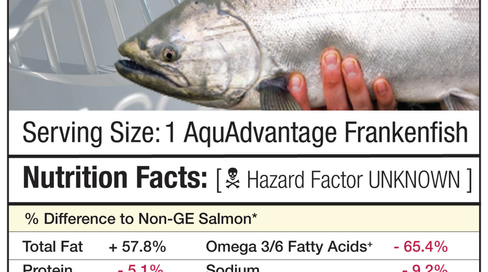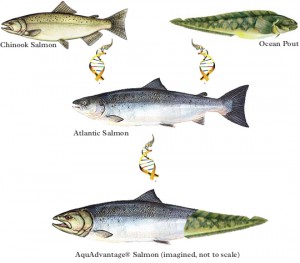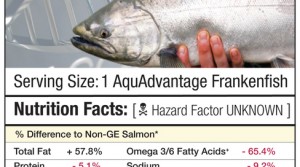
26 Apr EARTH MATTERS: THE FRANKENFISH COMETH?
 Thirteen years after AquaBounty first applied for approval of its genetically engineered (GE) AquAdvantage salmon, the United States Food and Drug Administration (FDA) is poised to finalize its environmental assessment (EA) with a Finding of No Significant Impact (FONSI) and approve the application. Friday was the deadline to submit comments to the FDA.
Thirteen years after AquaBounty first applied for approval of its genetically engineered (GE) AquAdvantage salmon, the United States Food and Drug Administration (FDA) is poised to finalize its environmental assessment (EA) with a Finding of No Significant Impact (FONSI) and approve the application. Friday was the deadline to submit comments to the FDA.
Despite over 1.5 million comments urging the FDA not to approve the fish; despite letters from Senators and Representatives of both parties calling for further review; and despite a deeply flawed and incomplete EA, the FDA is widely expected to move ahead with the first commercial approval of a genetically engineered animal for human consumption. The head of AquaBounty has said he expects approval within six months of the comment deadline. (See this link for more.)
I have written about GE salmon in the past – this link on Telluride Inside… and Out is an example – see this link – describing some of the problems with the FDA being the lead agency reviewing the application.
Why is that an issue? The FDA’s focus on animal drugs (which is what the living fish is being evaluated as); almost no expertise in evaluating potentially widespread environmental effects; and a serious lack of transparency. I also discussed some of the potential problems with the fish: ecological harm (to wild fish or other species); economic harm (to salmon fishermen who might lose markets to skeptical consumers – or lose livelihoods should escaped GE salmon threaten wild populations); and to my mind less likely, but I’m not an expert in the area, harm to human health.
On top of these concerns, outlined in my earlier post as well as by Ocean Conservancy’s George Leonard (go here and here and here) and Dartmouth professor, scientific expert Anne Kapuscinski (for her comments on the original FDA docket, go here), there are a range of new concerns that have come to light in research by several environmental and consumer health organizations.
Friends of the Earth lays out some of these concerns in its press release. They include mischaracterizations and missing information in the original docket, including a failure to disclose that inspectors found Infectious Salmon Anemia (ISA), a disease that has decimated the Chilean farmed salmon industry, at the facility in Canada that is growing eggs for AquaBounty and that AquaBounty’s lease at the facility in Panama where the fish are to be grown to market size is not likely to be renewed.
The comment period is now closed and expectations are that the FDA, because of what it sees as its extremely narrow purview, is likely to ignore the many concerns that have been raised. That does not mean that we should sit around and wait for the FDA’s decision, all hope lost and the fight over. In fact, there is still a lot to be done.
 First, the new information as well as the original (and uncorrected) inadequacies in the EA make a legal challenge very likely. Some environmental groups have already intimated that they will pursue a judgment in the courts if the FDA does not reconsider and, at the very least, find that the environmental assessment is insufficient to address the questions and concerns raised and therefore require a full-scale Environmental Impact Statement.
First, the new information as well as the original (and uncorrected) inadequacies in the EA make a legal challenge very likely. Some environmental groups have already intimated that they will pursue a judgment in the courts if the FDA does not reconsider and, at the very least, find that the environmental assessment is insufficient to address the questions and concerns raised and therefore require a full-scale Environmental Impact Statement.
In addition, a number of members of Congress who recognize the potential threats of this application to the environment and to regional economies – as well as the simple fact that citizens should have a choice about what they eat – are taking their own steps to protect against the potential harm GE fish could cause.
Representatives Young, Huffman, and Thompson on Tuesday introduced the Pegasus Act to require a full EIS; Senator Begich introduced the same bill in the Senate at the beginning of the 113th Congress. In addition, Senator Boxer and Representative DeFazio, with bipartisan support, introduced a labeling bill for all genetically engineered organisms on Wednesday.
Citizen support of these bills can go a long way to improving the current regulatory system and helping us know what we’re eating.


Sorry, the comment form is closed at this time.